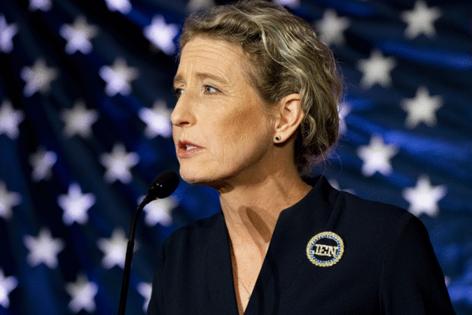Republican moderates press leadership on health credit extension
Published in News & Features
WASHINGTON — Thirteen moderate House Republicans are urging party leadership to find a path toward extending enhanced expiring health care tax credits once the government reopens.
“Let us be clear: significant reforms are needed to make these credits more fiscally responsible and ensure they are going to the Americans who need them most,” the Republican group wrote to Speaker Mike Johnson, R-La., on Tuesday. “Our Conference and President Trump have been clear that we will not take healthcare away from families who depend on it. This is our opportunity to demonstrate that commitment through action.”
The enhanced credits, which expire Dec. 31, are at the center of the government shutdown — Democrats are demanding they be extended before they vote to reopen the government, while Republicans are refusing to negotiate until the government reopens.
Three weeks into the shutdown, both parties appear dug in.
Nevertheless, millions of Americans who rely on the marketplace insurance subsidies live in red states, and their premiums are set to skyrocket.
The tax credits were first enacted in the 2010 health care law. In 2021, the then-Democratic-controlled Congress lifted income caps on the tax credits and made the financial assistance more generous.
While many Republicans blame that law for rising health insurance costs, others are floating changes to the tax credits they say are needed if they’re to agree to extend them. That includes reinstating income limits on the credits, capping eligibility to current recipients, tacking on minimum premiums for all income levels and restricting marketplace plans from covering certain services.
Rep. Jen Kiggans, R-Va., one of the letter’s signatories, has positioned herself as finding a middle ground on the issue and is the lead Republican on a bill to extend the enhanced tax credits for one year without any changes to its structure.
During a town hall event last week, Kiggans responded to a constituent question about what would happen after one year. She said that is still unclear.
“I wish I had a full-fledged defined answer I could give you. I don’t have the actual plan in place,” Kiggans said in an audio recording reviewed by CQ Roll Call. “But I know that nothing here in Washington happens fast and that this is a very complicated issue.”
“And if we don’t sit down and start talking about it, it’s not going to end well,” Kiggans continued. “And that’s my main source of frustration. We can’t do nothing about these tax credits that expire at the end of December. We need to do something.”
Open enrollment begins Nov. 1 for states that use the healthcare.gov marketplace. Insurers have said the enhanced tax credits can still be extended after that date, although it would be more of a lift for them.
“There are challenges associated with implementing a late extension of the health care tax credits, but these challenges are not insurmountable,” Mike Tuffin, president and CEO of America’s Health Insurance Plans, said in a statement last week.
Concepts of a plan
Vice President JD Vance and Johnson have both signaled that Republicans have an alternate health plan.
“We do have a plan, actually,” Vance said on Newsmax last week. Those plans have mostly revolved around health savings accounts, association health plans and price transparency.
“We’ve got pages and pages and pages of ideas on how to reform health care. You can’t rip Obamacare out at the roots. It’s too deeply ingrained now,” Johnson said last week on CNBC.
The impact of Republicans’ loosely proposed restrictions is unclear.
The party’s leadership has suggested that high earners shouldn’t be eligible for the credits, pointing to allegations that some who earn $600,000 a year are benefiting from them. But only 7% of total consumers with open enrollment period plan selections in 2025 had incomes above 400% of the federal poverty level, according to an analysis by the Bipartisan Policy Center.
For households earning 500% and above the poverty level, which amounts to $78,250 for a single individual or $160,750 for a family of four, that drops to only 4%.
President Donald Trump, who had lunch with Senate Republicans at the White House Tuesday, showed no interest in negotiating with Democrats about the health care tax credits until the shutdown is over.
“We will not be extorted on this crazy plot of theirs,” Trump said.
The others who wrote to Johnson are Reps. Jeff Van Drew of New Jersey, Carlos Gimenez of Florida, Monica De La Cruz of Texas, Mike Lawler of New York, Juan Ciscomani of Arizona, David Valadao of California, Rob Bresnahan Jr. of Pennsylvania, Thomas H. Kean Jr. of New Jersey, Young Kim of California, Ryan Mackenzie of Pennsylvania, Brian Fitzpatrick of Pennsylvania and Jeff Hurd of Colorado.
_____
(John T. Bennett contributed to this report.)
©2025 CQ-Roll Call, Inc., All Rights Reserved. Visit cqrollcall.com. Distributed by Tribune Content Agency, LLC.







Comments